Private Charles Alfred Duncan was born on April 13 1920 in Sidley, Bexhill-on-Sea, Sussex, to Sidney John and Elizabeth Duncan. He was one of a family of eleven children. Private Duncan originally enlisted into The Buffs (Royal East Kent Regiment) of the regular army on 29 August 1938. He subsequently served with the BEF in France from 16 September 1939 to 29 May 1940 in the early stages of the war before the withdrawal from Dunkirk. He transferred to the Army Air Corps on January 8 1942. Duncan subsequently completed his parachute jump training from 10 to 24 February 1942 as part of parachute course 8, which was described as "the most difficult that has yet been encountered" because "visibility [was] consistently poor and the ground very hard owing to frost". On completion, he joined the signals platoon of the 4th Parachute Battalion.
It was in North Africa with the 4th Parachute Battalion that Duncan earned his George Cross. In July 1943, the Battalion were at M'Saken airfield in Tunisia, waiting to fly to Sicily where the 2nd Parachute Brigade (including 4th Battalion) were to capture a bridge near Augusta. However, the 2nd Brigade was not needed as the Eight Army had linked up with the Special Raiding Squadron (SRS) ahead of schedule. The Brigade was therefore ordered to return to camp and unload its weapons. What followed was a tragic incident. Duncan's recommendation for the medal reads:
"On 10th July 1943, Private Duncan on returning to his Camp near M'Saken North Africa, after the postponement of an Airborne operation was removing primed grenades from his equipment in the company of a number of his comrades. One grenade fell to the ground and Private Duncan could very easily have saved his own life either by running away or throwing the grenade away. Seeing that this would have meant injuries being caused to the men standing near, Private Duncan unhesitatingly flung himself on the grenade and held it until it burst.
By this very gallant action Private Duncan undoubtedly saved the life of his comrades but at the cost of his own".
The recommendation was accepted and Duncan received a citation:
"On July 10th 1943 whilst defusing ammunition after a postponement of the parachute operation into Sicily a primed grenade was dropped in close proximity to and in a confined area where Duncan and others were working. Duncan walked over to retrieve it and discovered the pin was out and the fuse burning.
He did the only thing that could save the life of his comrades - throwing himself on top of the grenade and sacrificing his own".
The 4th Battalion war diary for July 10 1943 also records the incident:
"No. 6287023 Pte Duncan C, sustained fatal injuries by an accidental explosion of a Mills 36 Grenade. To save his comrades he fell on the Grenade".
For this action Duncan was awarded the George Cross dated November 9 1943 in The London Gazette. Interestingly, none of the official accounts confirm whether the grenade was dropped by Duncan himself, although this is implied.
He died aged 23 years old and is buried at Enfidaville War Cemetery, Tunisia. Charles had a brother named Frederick Jackson Duncan who held the George Cross after his brother's death for many years, before eventually presenting it to the Airborne Forces Museum, Aldershot, as part of his will. This occurred in a "small informal ceremony" at which the 4th Battalion 2nd i/c Major Ben Arkle was present.
Compiled with information from:
Airborne Assault Archive boxes
2 D1 29.1.4
2 D2 29.2.1
3 E4 3.4.1
4th Battalion War Diary
Pegasus Journal for October 1972
Read More



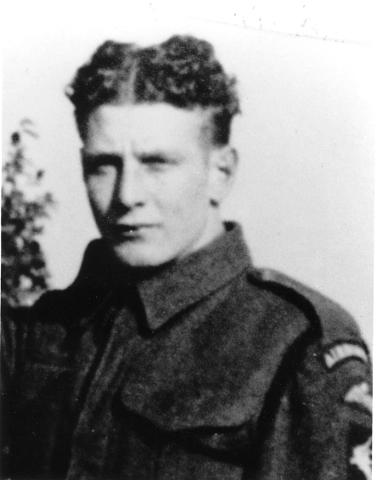
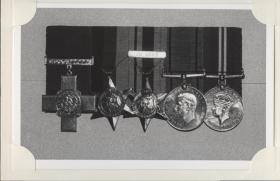
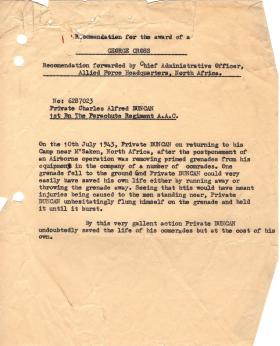
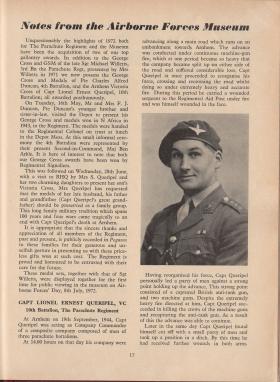
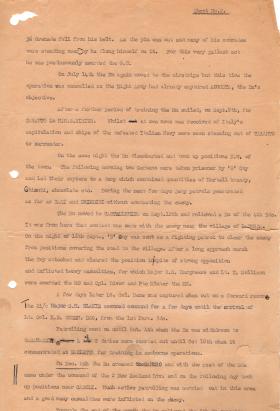
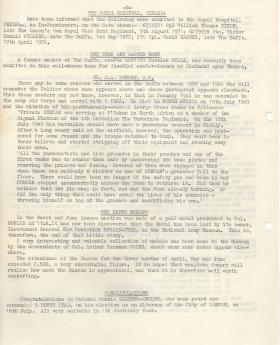
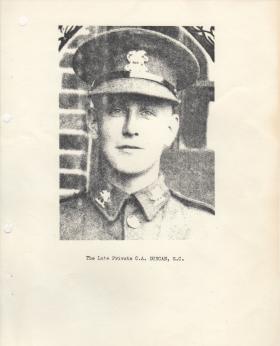
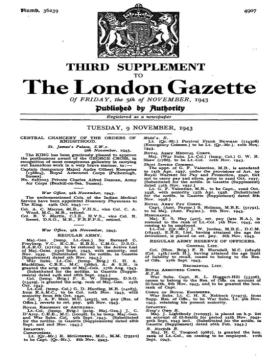
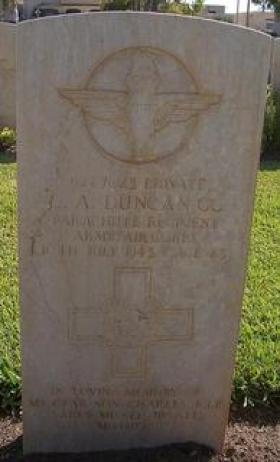
Latest Comments
There are currently no comments for this content.
Add Comment
In order to add comments you must be registered with ParaData.
If you are currently a ParaData member please login.
If you are not currently a ParaData member but wish to get involved please register.